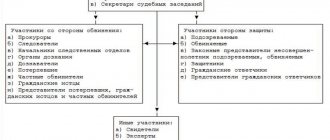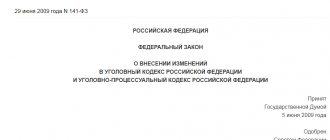New edition of Art. 173 Code of Criminal Procedure of the Russian Federation
1. The investigator interrogates the accused immediately after charges are brought against him in compliance with the requirements of paragraph 9 of part four of Article 47 and part three of Article 50 of this Code.
2. At the beginning of the interrogation, the investigator asks the accused whether he pleads guilty, whether he wishes to testify on the merits of the charges brought against him and in what language. If the accused refuses to testify, the investigator makes a corresponding entry in the protocol of his interrogation.
3. The interrogation is carried out in the manner established by Article 189 of this Code, with the exceptions established by this article.
4. Repeated interrogation of the accused on the same charge in the event of his refusal to testify at the first interrogation can be carried out only at the request of the accused himself.
The procedure for interrogating an accused (suspect) according to the Code of Criminal Procedure of the Russian Federation
- Before starting the interrogation, the investigator must verify the identity of the person being interrogated, i.e. check the passport or other identification document of the person to be interrogated.
- The investigator explains to the person his rights and responsibility for refusing to testify and for giving knowingly false testimony. ATTENTION: a person has the right not to testify against himself, his spouse and close relatives, to whom the procedural code includes parents, children, adoptive parents, adopted children, siblings, grandparents, grandchildren.
- In a situation where a person is a foreigner, the investigator finds out whether the person speaks Russian and whether he needs an interpreter.
- The investigator himself chooses the interrogation tactics. ATTENTION: the investigator is prohibited from asking leading questions. Most often, interrogation consists of questions from the investigator to the person to which the person being interrogated gives answers.
- During the interrogation, the interrogated person has the right to use documents and records. Also, a person can make some drawings, draw diagrams, which are attached to the interrogation protocol. If you don’t remember something, there is no need to guess and invent, you need to say that “I don’t remember”, “I need to look at the documents.”
- During interrogation, photography, audio recording, and video recording may be made, which must be recorded in the interrogation protocol.
- A witness may appear before the investigator for questioning with a lawyer, who, at the end of the questioning, has the right to make statements about violations of the rights and legitimate interests of the witness.
- At the end of the interrogation, the person whose interrogation was carried out must familiarize himself with the interrogation protocol and indicate: “from my words it was written down correctly, I read it.” ATTENTION: the interrogation protocol must contain information about all actions performed during the interrogation, namely, explanation of rights, video recording, provision of material evidence, inclusion of drawn diagrams, etc.
IMPORTANT : carefully read your interrogation protocol and sign each page of the interrogation protocol. There are situations when the investigator offers to sign the interrogation protocol, but does not explain that before signing, the protocol must be read, moreover, the investigator can say: “What to read there, I wrote down (printed) everything from your words” - in this case, it is better to read the protocol twice, since the information by the investigator may be distorted or recorded in such a way that the meaning of the testimony changes. Nobody says that an investigator can deliberately distort information, but this can still happen.
ADVICE OF A LAWYER : after reading the protocol and seeing that your testimony is not recorded as you gave it, you need to write comments in the interrogation protocol itself before signing such an interrogation protocol or asking the investigator to make additions and clarifications to the protocol. Otherwise, you will not be able to prove later that you did not give such testimony.
Although in judicial practice there are cases when witnesses come to court for questioning and explain that they gave different testimony, and the investigator was told that at the trial they will still tell how it happened. BUT such cases cannot guarantee that the witness will not subsequently be brought to criminal liability for giving knowingly false testimony, because the interrogated person signed the interrogation protocol.
HEALTHY:
Features of interrogation and the procedure for its conduct according to the Code of Criminal Procedure of the Russian Federation
According to the Code of Criminal Procedure of the Russian Federation, the investigative authorities have only a day to interrogate a suspect, the countdown of which begins after the arrest of a person involved in a criminal case.
How to interrogate a suspect in order:
- The suspect is invited to the investigator’s office, the presence of a defense lawyer is required, and his rights must be explained.
- The investigator is obliged to voice the reason for the detention and name the article of the Criminal Code, according to which the suspect can be brought to justice.
- The protocol of interrogation of a suspect must contain information including the time, place, date of its conduct, as well as personal data of those present (investigator, suspect, human rights activist). In addition, the protocol must reflect the entire course of the conversation, the questions asked, the answers to them, and whether the suspect considers himself guilty. If a person refuses to testify, a note to this effect is made in the protocol.
- At the end of the interrogation, the document must be signed by all participants in the process. Comments are added at the end, if any.
At night, interrogation is unacceptable, except for the cases provided for in Article 164 of the Code of Criminal Procedure of the Russian Federation. Night time includes the interval from 22:00 to 6 am. If the suspect, referring to Art. 51 of the Constitution of the Russian Federation, does not want to testify, repeated interrogation is possible, but only after the investigator manages to obtain permission from a lawyer.
Tricks and tricks of investigators when interrogating the accused
To solve a case, the investigator may resort to tricks and tricks. In this case, we will not consider the falsification of evidence in a criminal case by the investigator.
- ♦ The investigator may not explain the rights to the person being interrogated or may not explain all rights.
- ♦ As mentioned above, he may ask to sign the interrogation protocol and actually not give the person the opportunity to read the protocol and indicate his comments in it. At the same time, the investigator can behave kindly towards the person being interrogated, which will instill trust in himself.
- ♦ The investigator can say that he already knows everything, that the other interrogated persons have told everything, and the interrogated person only has to tell everything. At the same time, the investigator will not specify what exactly he knows, since in reality he most likely knows nothing.
- ♦ There may be a situation where the investigator will give the interrogated person to sign a blank interrogation protocol form, explaining this need in order not to detain the person or for some other reasons.
ADVICE OF A LAWYER : never sign any blank forms, do not leave blank lines between the text and your signature. There should also be no empty lines in the document text.
- ♦ The investigator can conduct interrogations for hours, thereby exhausting the person being interrogated so that the latter already agrees to everything. ATTENTION: according to the Code of Criminal Procedure of the Russian Federation, the interrogation of a witness can be carried out continuously for 4 hours, then a break must be taken for 1 hour. In total, the interrogation should last no more than 8 hours during the day.
- ♦ If a suspect is being interrogated, then the investigator may invite a so-called “pocket lawyer” to the interrogation, who will simply be present at the interrogation and nothing more, or he may also begin to persuade the person to confess everything, even if the person is not guilty of anything, saying that it will be better this way.
USEFUL : more advice from a lawyer on how to behave during a police interrogation at the link
Article 173. Interrogation of the accused
- home
- Laws and regulations
- Criminal Procedure Code of the Russian Federation
- Article 173. Interrogation of the accused
1. The investigator interrogates the accused immediately after charges are brought against him in compliance with the requirements of paragraph 9 of part four of Article 47 and part three of Article 50 of this Code.
2. At the beginning of the interrogation, the investigator asks the accused whether he pleads guilty, whether he wishes to testify on the merits of the charges brought against him and in what language. If the accused refuses to testify, the investigator makes a corresponding entry in the protocol of his interrogation.
3. The interrogation is carried out in the manner established by Article 189 of this Code, with the exceptions established by this article.
4. Repeated interrogation of the accused on the same charge in the event of his refusal to testify at the first interrogation can be carried out only at the request of the accused himself.
Commentary on Article 173
1. The rule on the immediate interrogation of the accused contained in Part 1 of the commented article means that there should be no gap in time between the filing of charges and the first interrogation of the accused.
2. The impossibility of immediate interrogation after the filing of charges due to the sudden illness of the accused and other circumstances is specified in the interrogation protocol or in a separate protocol.
3. A certain break is possible after the presentation of the charge, if the accused requests it in order to more accurately recall some circumstances, determine the position regarding the charge or its individual aspects, etc. During this break, he does not leave the interrogation site.
4. During the first interrogation of the accused, the investigator (interrogating officer) explains to him the rights provided for in Art. 47 Code of Criminal Procedure. During subsequent interrogations, if they are conducted without the participation of a defense lawyer, only the following rights are repeatedly explained to the accused: to object to the accusation, to testify on the charge brought against him, or to refuse to testify; present evidence; use the help of a translator for free; use the assistance of a defense lawyer, including free of charge in cases provided for by the Code of Criminal Procedure.
5. For the participation of an interpreter in the interrogation, see the comment. to Art. 18, 69, 164, 169.
6. If the constitutional provision was not explained to the accused during the inquiry or preliminary investigation, according to which no one is obliged to testify against himself, the testimony of this participant in the process must be recognized by the court as obtained in violation of the law and cannot be evidence of the guilt of the accused (Resolution of the Plenum of the Armed Forces of the Russian Federation dated 31.10.1995 N 8).
7. Giving evidence is a right, not an obligation, of the accused. He is not obliged to prove his innocence (Part 2 of Article 49 of the Constitution). The accused is not warned of criminal liability for knowingly giving false testimony.
8. Before the first interrogation, the accused has the right to have private and confidential meetings with the defense lawyer.
9. The defense attorney has the right to participate in interrogations of the accused (clause 5, part 1, article 53). The participation of the defense attorney is recorded in the protocol. In cases where a defense attorney does not participate in a criminal case and this is not recorded in the interrogation protocol as an accused, a written statement from the accused to refuse a defense attorney is attached to the case materials (Resolution of the Plenum of the Armed Forces of the Russian Federation dated 03/05/2004 N 1). On the rights of a defense attorney present during the interrogation of the accused, see commentary. to Art. 53.
10. For the procedure for inviting, appointing and replacing a defense attorney, see the commentary. to Art. 50.
11. Interrogation cannot last continuously for more than 4 hours. Continuation of the interrogation is allowed after a break of at least 1 hour for rest and eating, and the total duration of the interrogation during the day should not exceed 8 hours. If there are medical indications, the duration of the interrogation is established on the basis of the doctor’s conclusion (see commentary to Article 187).
12. The interrogation of a minor accused cannot continue without a break for more than 2 hours, and in total more than 4 hours a day (see commentary to Article 425).
13. Interrogation at night is not allowed. Night time refers to the time period from 22:00 to 6:00 local time. If the interrogation is not completed before 22 o'clock, then, as a general rule, a break is taken until the morning. If delay in obtaining the testimony of the accused may lead to the loss of evidence, interfere with the detention of accomplices, the search for the stolen property, and in other urgent cases, interrogation may be carried out at night.
14. As a general rule, the interrogation of the accused is carried out at the place of the preliminary investigation or inquiry. At the same time, the interrogator has the right, if he considers it necessary, to conduct the interrogation at the location of the accused.
15. At the beginning of the interrogation, the interrogator must ask the accused whether he pleads guilty to the charge brought against him, then the accused is asked to testify on the merits of the charge. After the accused has testified, the person being interrogated asks him questions, if necessary.
16. The accused is prohibited from asking leading questions. Otherwise, the investigator is free to choose interrogation tactics.
17. During interrogation, the accused has the right to use documents and records.
18. The use of technical means of recording testimony during interrogation imposes an obligation on the investigator to announce this to the interrogated person before the start of audio, video recording, etc.
19. All investigative actions with the participation of the accused are allowed only after his interrogation.
20. During interrogation, it is not allowed to present evidence obtained in violation of federal law.
21. It is prohibited to subject the interrogated person to violence, torture, or other cruel or degrading treatment (Article 21 of the Constitution, Article 9, Part 4 of Article 164 of the Code of Criminal Procedure).
22. When conducting an interrogation, deception, deliberate misrepresentation regarding some circumstances of the accusation, a “deal” with the accused, for example, when the investigator “in exchange” for an admission of guilt promises a mitigation of responsibility, a change in the preventive measure, etc., are unacceptable.
23. During the interrogation of the accused, the accused’s statement of an alibi is subject to mandatory verification.
24. When the accused changes his testimony during interrogation, both of his testimony are carefully checked in order to find out the reasons for the change in testimony and evaluate them in conjunction with other evidence collected in the case (BVS RF. 1996. No. 7. P. 4).
25. The prosecutor has the right to participate in any interrogation of the accused or conduct it himself (see commentary to Article 37).
26. According to the rule enshrined in Part 4 of the commented article, re-interrogation of the accused on the same charge in the event of his refusal to testify at the first interrogation is possible only at the request of the accused himself. This means that the protocol for the re-interrogation of the accused must contain a note certified by the signature of the accused that the interrogation is being carried out at his request. A written request for this may also be attached to the case.
27. For details of the interrogation of a minor accused, see commentary. to Art. 425.
28. On the peculiarities of the implementation and execution of the interrogation of the accused in the procedure of providing international legal assistance in criminal cases, see the commentary. to ch. 53.
Interrogation without a lawyer is illegal
During interrogation, a person has the right to have the assistance of a lawyer.
A person against whom a criminal case has been initiated has the right to a lawyer from the moment the case is initiated.
At the same time, the suspect or accused may refuse a defense lawyer, and in court say that he did not refuse a defense lawyer. In such a situation, on the basis of Art. 75 of the Code of Criminal Procedure of the Russian Federation, the testimony of the suspect and the accused will be considered inadmissible evidence, i.e. will not have legal force, therefore investigators always invite a lawyer in accordance with Art. 51 of the Code of Criminal Procedure of the Russian Federation, if the person has not invited his lawyer.
Thus, if the interrogation of a suspect or accused occurs without a lawyer, especially when the person did not refuse a lawyer, then this is illegal and during the consideration of the case by the court it is necessary to declare this and ask to recognize the interrogation records as inadmissible evidence.
Interrogation of a minor accused
When interrogating an accused person who has not reached the age of majority, the law establishes the following features:
- First of all, interrogation of a minor can only be carried out with the participation of his legal representative.
- You can interrogate a minor without a break for a maximum of 2 hours, after which you should take a break for 1 hour. The total interrogation time should not exceed 4 hours per day.
- When interrogating a minor, in addition to his legal representative, his defense attorney must also participate.
- If the accused has not reached the age of 16, then a teacher or psychologist must participate in his interrogation. The participation of these specialists is also necessary if the person has reached the age of 16, but suffers from a mental disorder or is developmentally delayed.
Repeated interrogation of the accused
The Code of Criminal Procedure of the Russian Federation does not provide for repeated interrogation of the accused, with the exception of one case when the accused refused to testify during the first interrogation, and then thought and thought and decided to testify. That is, the investigator can re-interrogate the accused only at the request of the latter. Thus, if the accused decides to testify on the charge against him, despite his initial refusal to testify, he may do so.
The purpose of such actions for the accused may be different, for example, the accused understands that the investigator will be able to prove his guilt, why aggravate his situation, and contributing to the investigation of the criminal case will subsequently be taken into account when deciding the verdict.
However, if a new charge is brought against the accused, then in this case there can be no question of any re-interrogation, i.e. new accusation - new interrogation.
It is also not a re-interrogation when the accused is asked to clarify some questions that arose during the investigation of a criminal case. Thus, additional interrogations by the investigator may be conducted without taking into account the opinion of the accused.
Commentary on Article 173 of the Code of Criminal Procedure of the Russian Federation
1. When interrogating the accused, the general rules of investigative actions (see com. to Article 164) and the general rules of interrogation (see com. to Articles 187, 189) are applied.
2. When interpreting the norms of this article, it is necessary to proceed from the general procedural position of the accused as a party to the process (see note to Article 47). The interrogation of the accused has the following goals: a) to clarify the legal position of the accused; b) obtain his testimony; c) provide him with the opportunity to put forward arguments in his defense. Giving evidence appears as a right of the accused (see note to Article 77). Immediacy of interrogation means compliance with two points: a) giving the accused the right to testify as quickly after the arraignment as he wishes; b) a ban on carrying out other investigative actions with the participation of the accused without granting him the right to testify on the charges brought against him. The investigator ensures the participation of the defense attorney in the interrogation of the accused. In this case, the interrogation is postponed until the end of the confidential meeting of the accused with the defense lawyer, the duration of which is not limited (clause 9, part 4, article 47 of the Code of Criminal Procedure). The interrogation is also postponed to ensure the appearance of the defense lawyer (see note to Article 50). Testimony of the accused, given without the participation of a defense lawyer, is always considered inadmissible if the accused refuses it (clause 1, part 2, article 75).
3. During interrogation, information comes from the accused that has three different legal meanings:
1) a statement of full, partial admission of guilt or non-admission. In addition to its evidentiary value, this statement in adversarial conditions acts in a sense as an act of command, a determination of the position of the party. In the future, the agreement of the accused with the charge may be the basis for a special procedure for trial under Section X of the Code;
2) the defendant’s arguments in his defense, his versions, assumptions, which in the theory of legal proceedings are usually called explanations. Being unrefuted, the versions of the accused (if they are true) must be interpreted in favor of the accused (for more information, see Article 77). It is precisely this significance of the testimony of the accused that the legislator considers to be the main one (see note to clause 1, part 2, article 75);
3) testimony as information about the facts that the accused perceived (actually evidentiary information). For indications, see com. to Art. 77.
4. Part 4 com. Article for the first time in domestic legislation limits the repeated interrogation of the accused. The meaning of this rule is to prohibit influencing the accused through repeated repeated interrogations. It follows that:
1) without the request of the accused, the following are unacceptable: a) repeated interrogations in order to get him to change previously given testimony (for example, in the opinion of the investigator, false); b) other investigative actions that require testimony from an accused who refused to testify during the first interrogation (for example, checking his testimony on the spot, identification by the accused himself);
2) unreasonable summons of the accused (for example, who is under recognizance not to leave the place) is prohibited;
3) the accused himself has the right to testify at any time. The accused’s request for re-interrogation can be made at any time and is subject to satisfaction, regardless of his consent or refusal to testify at the first interrogation. The request of the accused for his interrogation is considered according to the rules of Art. 159 Code of Criminal Procedure;
4) interrogation on a new or amended charge is carried out without the request of the accused.
Physical and psychological violence during interrogation of the accused
Everyone has probably heard about the physical and psychological violence used against accused persons during interrogation from various news reports. Our legislation prohibits the application of the specified measures of influence to the accused, however, despite individual cases of identifying the so-called “extortion of testimony,” little has changed in the law enforcement system, especially since interrogations are carried out behind closed doors, there is no way to subsequently prove the fact physical and psychological violence is difficult.
If the specified measures of influence are applied to the accused, you can try to inform your lawyer about this so that the latter takes some measures to protect his rights, you can also report these facts to the court at a court hearing, contact your relatives so that the latter write a complaint to prosecutor's office
You will need to be persistent in protecting your rights, but you should be very careful and “not get into trouble,” otherwise the consequences for the accused can be very dire, since behind closed doors priority remains with the investigative authorities.
USEFUL : for any illegal action of the investigator, write a complaint, watch the video for more details with additional advice from a lawyer
Peculiarities of interrogation of the accused in court
In court, the accused is interrogated in the presence of a judge, a defense lawyer, the prosecution, and also at the court hearing, if it is not closed, other persons, including representatives of the media, may be present. Initially, the court determines the procedure for examining evidence in the case, including at what point to interrogate the defendant (accused).
When the time comes for questioning the defendant, the court will explain to such person his rights and obligations, including the right to refuse to testify:
- If the defendant agrees to testify, he will tell about all the circumstances that he knows about the crime committed. After this, the defendant may be asked questions by the defense, the prosecution and the court.
- If the defendant is a minor, he is also interrogated in the presence of his legal representative, the defense, the prosecution and the court. In cases established by law regarding minors, the meeting is held behind closed doors. Also, in some cases, at the hearing, by analogy with the interrogation of the accused, the participation of a teacher or psychologist is mandatory.
- If they decided to interrogate the defendant first, but he refused to testify, then after studying all the materials of the case, the defendant can declare that he wants to testify, in which case the court will grant him such a right, the parties will be able to ask questions to the defendant.
ATTENTION : It is not allowed to ask leading questions when interrogating the defendant, as well as other persons.
If during the interrogation of the defendant there are contradictions with the testimony that he gave at the stage of the investigation of the criminal case, then the prosecutor will petition the court to read out the testimony of the defendant given by him during the preliminary investigation as an accused. After the reading of the testimony, it will be clarified whether the defendant gave the testimony that was read out, and why the testimony at the trial differs from the testimony given to the investigator. In the future, all identified and established circumstances will be assessed.
Tactics, features, interrogation procedure
The interrogation of the accused and the suspect is quite complicated in that the person involved rarely confesses right away; often he tries to get out of it and comes up with circumstances that justify him. The investigator is faced with the task of correctly exposing the lie and getting the real circumstances of the case to be voiced. Difficulties may arise for the following reasons:
- The person involved is afraid of revenge from accomplices or relatives of the victims.
- The desire to conceal the fact of committing illegal acts.
- The desire to mitigate guilt or completely evade responsibility on the part of the accused or suspect.
- In some cases, self-incrimination occurs when the suspect takes credit for the crimes of others because he is threatened or paid.
Tactics for exposing lies
The investigator does not have the right to use physical or moral violence. There are tactics for interrogating a suspect without violence:
- By persuading the suspect or accused to tell the truth, since this is beneficial to the person under investigation.
- Clarification of rights, consequences of giving false testimony.
- Persuasion by demonstrating available evidence incriminating guilt.
- Appeal to the positive aspects of the suspect's character.
- If the interrogated person has hostile relations with his accomplices, this can be used for his own purposes, for example, by informing him that his accomplices have already confessed and pointed to him as the culprit.
- Ask an unexpected question.
- The use of logic that confuses the person being interrogated and exposes his lies.
- Ask about small details that may not even be directly related to the case, compare them with the testimony of other witnesses and defendants
- Analysis and comparison of testimonies of different persons.
- Demonstration of the profitability of a deal with justice, in which the suspect can ease his fate in court.
- Creating the feeling in the interrogated person that the investigation is well aware of the situation, and testimony is needed only as a formality.
- The use of indirect questions that will be insignificant for the person being interrogated, but for the case can play a decisive role.
- Try to force the person involved to talk at length, clarify the details in which he will certainly get confused.
- Confrontation or cross-examination, such techniques will help to reveal the truth if there are several suspects, they give different testimony, or one of them is silent. In this case, a skirmish will occur between them, and the investigation will be able to obtain the necessary information.
The interrogation may also contain other tactics, which the investigator can combine at his discretion depending on the situation. It is necessary to use the factor of surprise, which may consist of the following:
- A suddenly asked important question that is logically not connected with previously posed questions.
- Presentation of available evidence at a time that is unexpected for the interrogated person.
- Announcing investigative actions after the interrogation is over can be a bluff, the main thing is to influence the person being interrogated morally.
Video about how the interrogation takes place:





